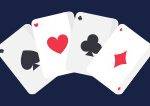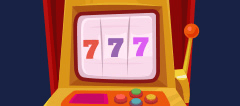With over ten years of experience working with gambling and writing about casinos, Kate brings a lot of knowledge to CasinoTop3.com. Kate oversees all the content written on CasinoTop3.com to ensure it contains factual information with value to you as a player.
Understanding the Game – How to Learn Poker

Poker is a world rich with strategy and variety, offering different styles of play that cater to a wide range of skills and preferences. The most commonly played versions include Texas Hold ’em, Omaha, Pai-Gow Poker, Seven-Card Stud, and Five-Card Draw, each bringing its own unique set of rules and strategies to the table.
Understanding the basic structure of poker is essential. Each game involves rounds of betting, where players wager based on the strength of their hands. This intricate dance of bets, bluffs, and calculated risks is the essence of poker, a blend of strategy, intuition, and chance.
➡️ Online Courses
There are a myriad of online poker courses out there to choose from, and if you have money to spend, this might be a good way to get a fast and thorough introduction to the art of poker. There are also free poker schools and tutorials available online, and they will take you through all the hand rankings and the basic strategies you can use when playing.
For some players, these courses are a great start when getting into poker, while others prefer to get more hands-on from the very start. Learning how to get good at poker will vary for every individual, so you should test a few things out to find what works best for you. It can be a good idea to check out the poker games you find in the best real money online casinos, before you try your luck in the poker rooms.
➡️ Understanding the Lingo
Poker is a very special game, in that it has a whole language of its own that might sound entirely magical if you haven’t been initiated. Fold, call, raise and bluff – these words all have meaning to most people, but to poker players they take on a second meaning. It’s no good thinking that you’re going to start out playing against experienced poker players if you can’t even keep up with what’s being said at the table.
Start by making a glossary of the terms that are most useful, and make sure that you understand them fully as part of the gameplay.
➡️ Hand Rankings
Even if you have no idea about different poker strategies and how to best play your hand, you can still get a certain way just by understanding the hand rankings. Most people know what a full house is, but do you immediately remember the difference between a straight and a flush, and which one of them holds the higher value?
Learning the hand rankings doesn’t take very long at all, but just like the glossary, it might be helpful to make a list when you are just getting started.
Choose the Best Online Poker Sites
Most players who are really interested in how to become an online poker player will start out at the online tables you find in an online casino. Trying for free can be great for learning the rules, but once you have learned the ropes, you can only improve by challenging yourself. Start by picking one of the best online poker sites and practice against real players.
These tables are not only more readily available, but they also let the player sit in the privacy of their own home, having less importance placed on your body language giveaways. No need to contain your excitement when those aces turn up.
Another advantage to starting with the online tables is that they normally offer a wide range of levels for bets and skill. As a rookie, you’ll want to start soft, with lower bets and more players on your level. Once you start feeling your confidence rising, you can head on over to the tables with higher stakes and higher levels of skill.
If you are brand new to online gambling, take a look at our list of best online casinos if you are keen on getting started.
Practice Being a Professional Poker Player
There’s nothing more important for how to learn poker than to actually practice it. You should practice as often as you can and in as many different ways as you can. Being a great poker player at an online table is not the same as being a great player at a physical table, and if you really want to know how to be a professional poker player, you need to put the time in at both tables.
As with any craft, building a strong foundation is crucial in poker. This doesn’t just mean learning the rules—it involves understanding the intricate strategies and tactics that form the backbone of a successful play. The subtle interplay between aggression and patience, the science of betting, and the art of bluffing are all crucial components of this foundation.
➡️ Learn Poker Math
Central to this learning process is poker math—understanding odds and probabilities is vital to making informed decisions at the table. This isn’t just about crunching numbers—it’s about comprehending how these figures translate into real-world situations and using that knowledge to gain an edge over your opponents.
The fundamental grasp of poker math is often what separates hobbyists from professionals. It’s not an overnight process, but with diligence and perseverance, these skills can become second nature.
➡️ Physical Poker
Practising physical poker is of the utmost importance if you want to learn how to become a professional poker player. Of course, you can base yourself almost entirely on online games, but if you’d like to compete in tournaments such as the World Series of Poker, you have to work on your table manners as well.
The best thing you can do when you start to practice poker is to play with your friends or acquaintances. Keep the stakes low and spirits high, and just get into the game. You can also play live games on many new casino sites to practice the gameplay.
As soon as you feel in control of your facial expressions and feel that you can at least get some read on others, you should try to find poker games to join outside your group. Tournaments are fairly common, and if you search your local area for poker tables, you’re sure to find a few that will be happy to take you in.
The Psychology of Poker
While understanding the technical aspects of poker is important, mastering the psychological aspects can give you a significant edge. At its core, poker is a game of incomplete information, and being able to accurately read your opponents’ behaviour and emotional state can help you make better decisions.
Emotional control, or ‘poker face’, is another crucial aspect of poker psychology. You must be able to control your emotions to prevent giving away any tells to your opponents. The control of your face might not be such a crucial element when playing online, but if your aim is to play at the big tables in Vegas, you should use it as an opportunity to practice facial control.
Additionally, maintaining emotional stability can help you make rational decisions, even in high-pressure situations. This applies to both online and brick-and-mortar poker and is a crucial skill for professional gamblers.
Taking the Leap to Professional
So, you’ve honed your skills and have a solid understanding of poker strategy and psychology. You’ve been successful in online games and local tournaments. You might be asking, “Am I ready to become a professional poker player?”
Turning professional involves a significant leap. It means playing poker for a living and relying on your winnings to cover your bills and expenses. To do this, you’ll need a robust bankroll – a certain amount of money set aside solely for playing poker. It’s crucial to manage this bankroll effectively and ensure that you’re playing at stakes that your bankroll can support.
Taking the leap also involves networking. Building relationships with other poker players can open up opportunities for learning, sponsorship, and collaboration. It can help you learn about the business side of poker, provide emotional support during tough times, and potentially open doors to higher-stakes games.
Managing Your Poker Career
Once you’ve stepped into the realm of professional poker, you’re no longer just a player; you’re a one-person business. This means thinking about poker in terms of long-term strategy, not just individual hands or sessions. Key to this is striking a healthy balance between work and leisure. Even though poker is your passion, you must ensure it does not consume your life entirely. Take time for hobbies, family, and friends to maintain a holistic and healthy lifestyle.
Equally important is developing resilience to deal with inevitable losses and downswings. Poker is a game of skill, but it also involves a significant amount of luck. Even the best players in the world experience losing streaks.
How you handle these downswings can often be the difference between long-term success or failure in your poker career. The key is to have a bankroll that takes losses into account, so you have funds to take you comfortably through the downswings.
➡️ The Legalities and Ethics of Poker
Understanding the legal landscape of poker is crucial. This includes not only the laws surrounding online gambling in your local jurisdiction but also the rules and regulations of different poker tournaments and casinos. Ensure you’re playing legally and responsibly to maintain the integrity of the game and your professional career.
Moreover, advocating for fair play is essential. Cheating, whether through collusion, the use of bots, or other unethical means, is not only against the rules but also damaging to the entire poker community. As a professional, you have a responsibility to uphold the integrity of the game and promote a culture of fair and honest play.
➡️ Taxes from Playing Poker
Knowing the tax laws for gambling is important for all gamblers but extra crucial for professionals. Since poker is your main source of income, you need to be prepared to pay taxes from your winnings.
The tax laws for gambling are unique to each country and/or province, so we recommend you read up on the local tax laws where you reside. If you fail to obey your local tax laws, you might risk hefty fines or even jail time, which could mean an end to your professional poker career.
Conclusion
Becoming a professional poker player is an exciting but challenging journey. It requires a deep understanding of the game, a strong foundation of skills and strategy, the ability to manage one’s emotions, and the discipline to navigate the ups and downs of a poker career.
Though the path may be fraught with challenges, the rewards – both financial and personal – can make the journey well worth the effort.
















